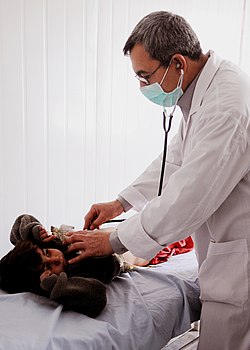
Back معالج تنفسي Arabic Inhalothérapeute French Beademingsverpleegkundige Dutch Terapeuta respiratório Portuguese 呼吸治疗师 Chinese
This article has multiple issues. Please help improve it or discuss these issues on the talk page. (Learn how and when to remove these messages)
|
 A clinician listening to the chest of a pediatric patient. | |
| Occupation | |
|---|---|
| Names |
|
Occupation type | Specialty |
Activity sectors | Resporation Therapy, Medicine, Allied Health, Pulmonology, Critical care medicine |
| Description | |
Education required |
|
Fields of employment |
Flight Transport, Air Ambulance Teaching or nursing home |
Related jobs | |
A respiratory therapist is a specialized healthcare practitioner trained in critical care and cardio-pulmonary medicine in order to work therapeutically with people who have acute critical conditions, cardiac and pulmonary disease. Respiratory therapists graduate from a college or university with a degree in respiratory therapy and have passed a national board certifying examination. The NBRC (National Board for Respiratory Care) is responsible for credentialing as a CRT (certified respiratory therapist), or RRT (registered respiratory therapist) in the United States. The CBRC (Canadian Board for Respiratory Care) is responsible for credentialing as an RRT in Canada.
The specialty certifications of respiratory therapy include: CPFT and RPFT (Certified or Registered Pulmonary Function Technologist), ACCS (Adult Critical Care Specialist), NPS (Neonatal/Pediatric Specialist), and SDS (Sleep Disorder Specialist).
Respiratory therapists work in hospitals in the intensive care units (Adult, Pediatric, and Neonatal), on hospital floors, in emergency departments, in pulmonary functioning laboratories (PFTs), are able to intubate patients, work in sleep labs (polysomnography) (PSG) labs, and in home care specifically DME (durable medical equipment) and home oxygen.
Respiratory therapists are specialists and educators in many areas including cardiology, pulmonology, and sleep therapy. Respiratory therapists are clinicians trained in advanced airway management; establishing and maintaining the airway during management of trauma, and intensive care.
Respiratory therapists initiate and manage life support for people in intensive care units and emergency departments, stabilizing, treating and managing pre-hospital and hospital-to-hospital patient transport by air or ground ambulance.
In the outpatient setting respiratory therapists work as educators in asthma clinics, ancillary clinical staff in pediatric clinics, and sleep-disorder diagnosticians in sleep-clinics, they also serve as clinical providers in cardiology clinics and cath-labs, as well as working in pulmonary rehabilitation.